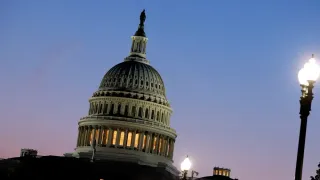March 4, 2015
Watchers of the Sky
Kilian Melloy READ TIME: 3 MIN.
Edet Belzberg's documentary about the persistent (and largely neglected) issue of genocide follows two major tracks. In one, we're given a deft and detailed biography of Raphael Lemken, a Polish Jew who, after surviving the Holocaust, devoted his life to redefining the systematic eradication of specified groups of people. In the pursuit of this goal, Lemken lived like a pauper, haunted the halls of the United Nations (where he actually did have an impact), and coined the word "genocide" itself to help policymakers comprehend the nature of the crime he was trying to define and outlaw.
In the film's other track we follow the progress of the International Criminal Court as prosecutor Luis Moreno Ocampo -- a native of Argentina and a witness of the brutalities that took place there -- presses ahead with a case against Sudanese president Omar al-Bashir for the crime of genocide against the people of the Sudanese region of Darfur.
Against the backdrop of these entwined narratives we meet articulate, thoughtful advocates for a system of international law that not only defines and recognizes genocide, but also punishes perpetrators in something more than a haphazard fashion. Among those who relate key bits of history and other information are Samantha Power, the United States Ambassador to the United Nations and author of the Pulitzer Prize-winning book "A Problem from Hell: America in the Age of Genocide." Also featured is Ben Ferencz, a lawyer who served as a prosecutor during the Nuremberg Trials and, more recently, has taken up Lemkin's cause; we see him press the U.N. for an international law that would make "acts of aggression" -- that is to say, launching wars -- illegal. (Not surprisingly, though this is not covered in the film, Ferencz has publicly expressed the view that George W. Bush be tried as an aggressor for his role in the Iraq War.) Others, including a survivor of the Rwandan genocide of Hutus against Tutsis, address the problem in interviews.
Depressingly, this film makes clear that the world at large cares little for the plight of minorities being persecuted by their own governments; moreover, governments (including the United States) continue to resist international laws that would clamp down on genocide -- in part, we're told, for fear that they would lose "sovereignty" over their own people (though what sort of defensible sovereignty involves butchering ethnic, religious, or other minorities is hard to imagine). Just as educational is the observation that once violence against a minority begins, it seldom is countered effectually until the victims themselves take up arms and start fighting back -- a solution Lemkin particularly abhorred and wanted to avoid.
The extras include "Ben at the Unted Nations," in which Ferencz delivers a stirring, impassioned speech; "A Day with the Rebels," in which Darfurian resistance fighters offer their views; and a series of "Interviews with Lemkin Friends and Family," which is exactly what it sounds like: Cousins, friends, and intimates of the man, who died in the 1950s, recall who he was and what he was like.
This is a tough documentary to watch -- not because of gore or violence, but because of what it says about human nature. One comes away convinced of the need for international laws on genocide -- enforceable laws, even teeth by actionable consequences for perpetrators -- because of the universality of genocide. We might think it couldn't happen here, but the truth is it can (and has) happened everywhere, throughout time. GLBTs and all other minorities need to see and understand what this film is saying.
"Watchers of the Sky"
DVD
$29.95
http://www.musicboxfilms.com/watchers-of-the-sky-movies-108.php






